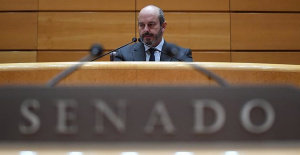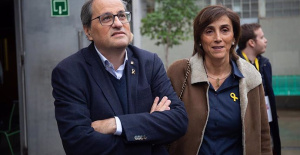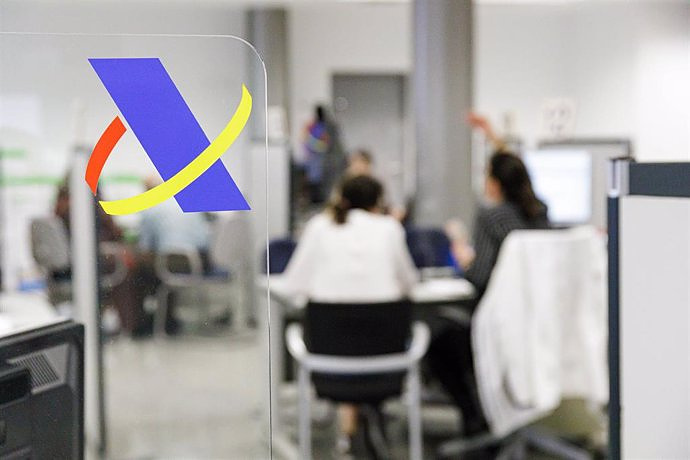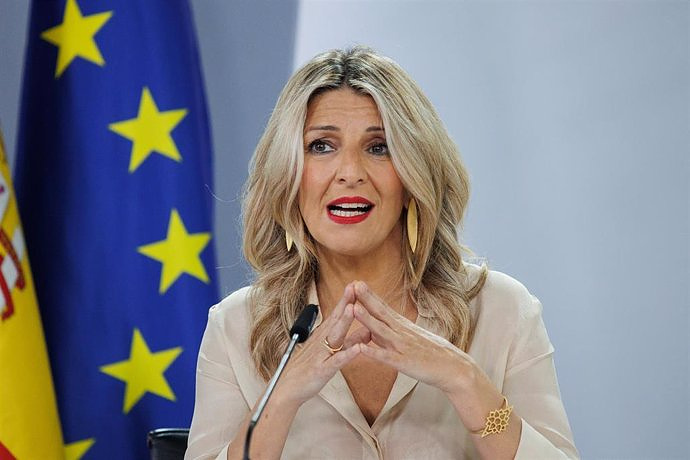The judges request a forensic report that proves that his entry into a prison can negatively affect his medical treatment
MADRID, 23 Dic. (EUROPA PRESS) -
The former socialist president of the Junta de Andalucía José Antonio Griñán will be able to avoid going to jail as ordered yesterday by the Seville Court, which enabled a period of ten days for his voluntary admission for the 'ERE case', if this court makes the same decision than with the former Deputy Minister of Employment Agustín Barberá, for whom the execution of his sentence has been temporarily suspended for health reasons.
In the event that the Court of Seville maintains its decision to imprison, the Ministry of the Interior would continue to have the key to mitigate his time in prison or even release him, since Penitentiary Institutions is in charge of establishing his penitentiary classification -the initial , within a maximum period of two months-- and you can do it attending to issues such as your health.
Hours after the First Section of the Court dismissed his appeal for the initial denial of suspension of the prison sentence of six years and one day, Griñán's defense has argued that it is possible to order the suspension of the deprivation of prison sentence without any requirement, but in this case alleging that his client is sick.
The former president's lawyer has requested the suspension of the execution of the sentence in accordance with article 80.4 of the Penal Code --for very serious illness with incurable conditions--, to which the Court of Seville has responded by releasing an official letter to the Institute of Legal Medicine ( IML) to prove this situation. It is the same procedure followed with the former vice-counselor Barberá.
Specifically, the magistrates request that the designated coroner, "after examining the documentation and with the recognition of the patient if necessary, issue a report assessing whether admission to the prison could have an impact on the development of the disease or on the prescribed treatment".
The Court of Seville notified this Thursday by order that Griñán and six others convicted by the ERE - all except Barberá - have to enter prison. They are the former Minister of Finance Carmen Martínez Aguayo; the former Minister of Innovation Francisco Vallejo; the former Minister of Employment and Technological Development José Antonio Viera; the former Minister of Employment Antonio Fernández; the former director of the IDEA agency Miguel Ángel Serrano and the former vice-counselor of Innovation Jesús María Rodríguez Román.
In his appeal, Griñán wanted to wait for the resolution on his request for pardon and asked to "set a reasonable term longer than the agreed ten days", specifically proposing three months to "avoid compliance (of the prison sentence) that could be unsuccessful, undue unnecessary or improper".
"There is no circumstance that advises the suspension of the sentence for a request for pardon," replied the magistrates, who will now have to decide whether Griñán's illness is a reason for such a suspension.
In the event that the decision for Griñán to enter prison is maintained, the former Andalusian president, like the rest of the convicts, can choose a prison of his choice taking into account the proximity to his home due to family ties, among others. factors.
The agency dependent on the Ministry of the Interior will also have to decide, after a pronouncement by the team of technicians that is part of the treatment board, whether the inmate is classified in the second degree or ordinary regime --the most common--, also being able to opt for any of the modalities of semi-liberty of the third degree or even probation.
Legal sources recall that, among the legal ways to speed up his release from prison, Griñán can also benefit from the principle of flexibility of article 100.2 --recently approved for the ex-treasurer of the PP Luis Bárcenas--, as well as other articles of the Prison Regulations such as 104.4, which regulates "special cases".
This last article refers to "very seriously ill convicts with incurable conditions according to a medical report" and establishes that, regardless of the variables involved in the classification process, "they may be classified in third degree for humanitarian reasons and personal dignity, taking into account the difficulty of committing a crime and its low danger".
The Penitentiary Regulation establishes a maximum term of two months from the reception in the prison of the testimony of the sentence. In the event that he is classified in second grade, the inmate has to wait until he has served a quarter of his sentence to be able to request exit permits, which would require prior authorization.

 Exploring Cardano: Inner Workings and Advantages of this Cryptocurrency
Exploring Cardano: Inner Workings and Advantages of this Cryptocurrency Seville.- Economy.- Innova.- STSA inaugurates its new painting and sealing hangar in San Pablo, for 18 million
Seville.- Economy.- Innova.- STSA inaugurates its new painting and sealing hangar in San Pablo, for 18 million Innova.- More than 300 volunteers join the Andalucía Compromiso Digital network in one month to facilitate access to ICT
Innova.- More than 300 volunteers join the Andalucía Compromiso Digital network in one month to facilitate access to ICT Innova.-AMP.- Ayesa acquires 51% of Sadiel, which will create new technological engineering products and expand markets
Innova.-AMP.- Ayesa acquires 51% of Sadiel, which will create new technological engineering products and expand markets The amnesty faces its final stretch in the Senate with the question of whether it will be voted this week or after the Catalan elections.
The amnesty faces its final stretch in the Senate with the question of whether it will be voted this week or after the Catalan elections. The PP will send to Moncloa the 1,136 letters from citizens with their real problems that it received in Sánchez's reflection
The PP will send to Moncloa the 1,136 letters from citizens with their real problems that it received in Sánchez's reflection Carola Miró, wife of former president of the Generalitat Quim Torra, dies
Carola Miró, wife of former president of the Generalitat Quim Torra, dies 12M.- Díaz asks Sánchez to recognize the Palestinian State in the next Council of Ministers
12M.- Díaz asks Sánchez to recognize the Palestinian State in the next Council of Ministers How Blockchain in being used to shape the future
How Blockchain in being used to shape the future Not just BTC and ETH: Here Are Some More Interesting Coins Worth Focusing on
Not just BTC and ETH: Here Are Some More Interesting Coins Worth Focusing on A sensor system obtains the fingerprint of essential oils and detects if they have been adulterated
A sensor system obtains the fingerprint of essential oils and detects if they have been adulterated Faraday UPV presents the 'Origin' rocket to exceed 10 km of flight: "It is the beginning of the journey to space"
Faraday UPV presents the 'Origin' rocket to exceed 10 km of flight: "It is the beginning of the journey to space" The Generalitat calls for aid worth 4 million to promote innovation projects in municipalities
The Generalitat calls for aid worth 4 million to promote innovation projects in municipalities UPV students design an app that helps improve the ventilation of homes in the face of high temperatures
UPV students design an app that helps improve the ventilation of homes in the face of high temperatures A million people demonstrate in France against Macron's pension reform
A million people demonstrate in France against Macron's pension reform Russia launches several missiles against "critical infrastructure" in the city of Zaporizhia
Russia launches several missiles against "critical infrastructure" in the city of Zaporizhia A "procession" remembers the dead of the Calabria shipwreck as bodies continue to wash up on the shore
A "procession" remembers the dead of the Calabria shipwreck as bodies continue to wash up on the shore Prison sentences handed down for three prominent Hong Kong pro-democracy activists
Prison sentences handed down for three prominent Hong Kong pro-democracy activists ETH continues to leave trading platforms, Ethereum balance on exchanges lowest in 3 years
ETH continues to leave trading platforms, Ethereum balance on exchanges lowest in 3 years Investors invest $450 million in Consensys, Ethereum incubator now valued at $7 billion
Investors invest $450 million in Consensys, Ethereum incubator now valued at $7 billion Alchemy Integrates Ethereum L2 Product Starknet to Enhance Web3 Scalability at a Price 100x Lower Than L1 Fees
Alchemy Integrates Ethereum L2 Product Starknet to Enhance Web3 Scalability at a Price 100x Lower Than L1 Fees Mining Report: Bitcoin's Electricity Consumption Declines by 25% in Q1 2022
Mining Report: Bitcoin's Electricity Consumption Declines by 25% in Q1 2022 Oil-to-Bitcoin Mining Firm Crusoe Energy Systems Raised $505 Million
Oil-to-Bitcoin Mining Firm Crusoe Energy Systems Raised $505 Million Microbt reveals the latest Bitcoin mining rigs -- Machines produce up to 126 TH/s with custom 5nm chip design
Microbt reveals the latest Bitcoin mining rigs -- Machines produce up to 126 TH/s with custom 5nm chip design Bitcoin's Mining Difficulty Hits a Lifetime High, With More Than 90% of BTC Supply Issued
Bitcoin's Mining Difficulty Hits a Lifetime High, With More Than 90% of BTC Supply Issued The Biggest Movers are Near, EOS, and RUNE during Friday's Selloff
The Biggest Movers are Near, EOS, and RUNE during Friday's Selloff Global Markets Spooked by a Hawkish Fed and Covid, Stocks and Crypto Gain After Musk Buys Twitter
Global Markets Spooked by a Hawkish Fed and Covid, Stocks and Crypto Gain After Musk Buys Twitter Bitso to offset carbon emissions from the Trading Platform's ERC20, ETH, and BTC Transactions
Bitso to offset carbon emissions from the Trading Platform's ERC20, ETH, and BTC Transactions Draftkings Announces 2022 College Hoops NFT Selection for March Madness
Draftkings Announces 2022 College Hoops NFT Selection for March Madness




























